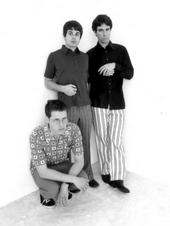A veteran of semi-seminal OC hardcore bands Inside Out and Headfirst , Rosas formed Smile in 1992 with Headfirst bassist and fellow Woodbridge High student Aaron Sonnenberg. The two placed an ad for a drummer in the Recycler, which led them to the prosaic Barstow home of Scott Reeder. "He was completely different from Aaron and me," Rosas remembers. "He was this Barstow rocker guy. Long hair, checkered pants, ripped Pink Floyd tank top and a bandana on his head. He was the best drummer I'd ever played with in my life." The threesome released a seven-inch ("Resin"), and then in 1995 released a sludgy bombastic yawp of grunge called Maquee on the San Diego-based Headhunter label. Rosas' particular lyrical yens—insouciant or wry fatalism, revenge fantasies, bizarre suburban Gothicism—made early appearances here. On Maquee's very self-conscious "Rock Anthem for the Retarded Teenage Hipster Population," Rosas sings: "Before we start, I'd like to say that we're all done/Remember what we started for, remember it was fun/Now we try so hard to look like we don't try/The only things that we become are all the unimportant things we buy/ . . . The only thing we learn from our mistakes is that we make a lot of mistakes." Smile smelled like teen spirit back then.
Before long, Atlantic Records came calling, signed the band and gave them a hefty advance. The musicians quit their day jobs, moved out of their parents' houses and began touring the country. Atlantic rereleased Maquee, and "Staring at the Sun" was getting airplay. Rosas remembers pulling into a Colorado town and hearing promo spots on the radio for their show that night. When they got to the club, there was a line down the block; the show was sold out.
Smile stayed on the road for about a year and a half before taking time off to work on a new album. It was at this point that things started getting messy. Sonnenberg hadn't loved touring the way Rosas and Reeder did. It was clear he was going to quit. The band found an easy replacement in John Doe Thing bassist Bob Thompson. Meanwhile, recording in San Diego with Mark Trombino, the band began to feel what Rosas describes as "resistance" from Atlantic. To make a very long story short, Smile ultimately asked to leave the label; Atlantic obliged and even let them take their unfinished album with them. Eventually Girl Crushes Boy came out on Headhunter, to whom Smile were still contractually bound. Though Rosas was never entirely happy with Girl Crushes Boy, most listeners regard it as a masterpiece, and much more in keeping with the sound that Smile grew into—jangly, layered, Beatles-influenced '60s pop—than Maquee.
At this point, about 1999, Smile, with the addition of Matt Fletcher ..boards, began playing around again in OC and Los Angeles. They were rebuilding their fan base. Things seemed to be on an upswing when Reeder told Rosas he was quitting to join San Clemente hard rockers Fu Manchu. "I think he left because he wanted to be in a situation where he felt inspired again," Rosas recalls. "He knew I would understand and I totally did even though it was still sad."
Sad? Rosas was fairly devastated by the loss. Matt Fletcher brought up the idea of his brother James, who'd played in a number of Costa Mesa bands like Film Star and the Women. Smile tried him out. It worked. Once more, the machine swung into gear. A five-song demo was recorded and sold at shows; Smile was selling out Chain Reaction and doing well in LA.
The Long Way Out: Smile decide to end it all by Alison M. Rosen
Published on June 19, 2003; OCWeekly
